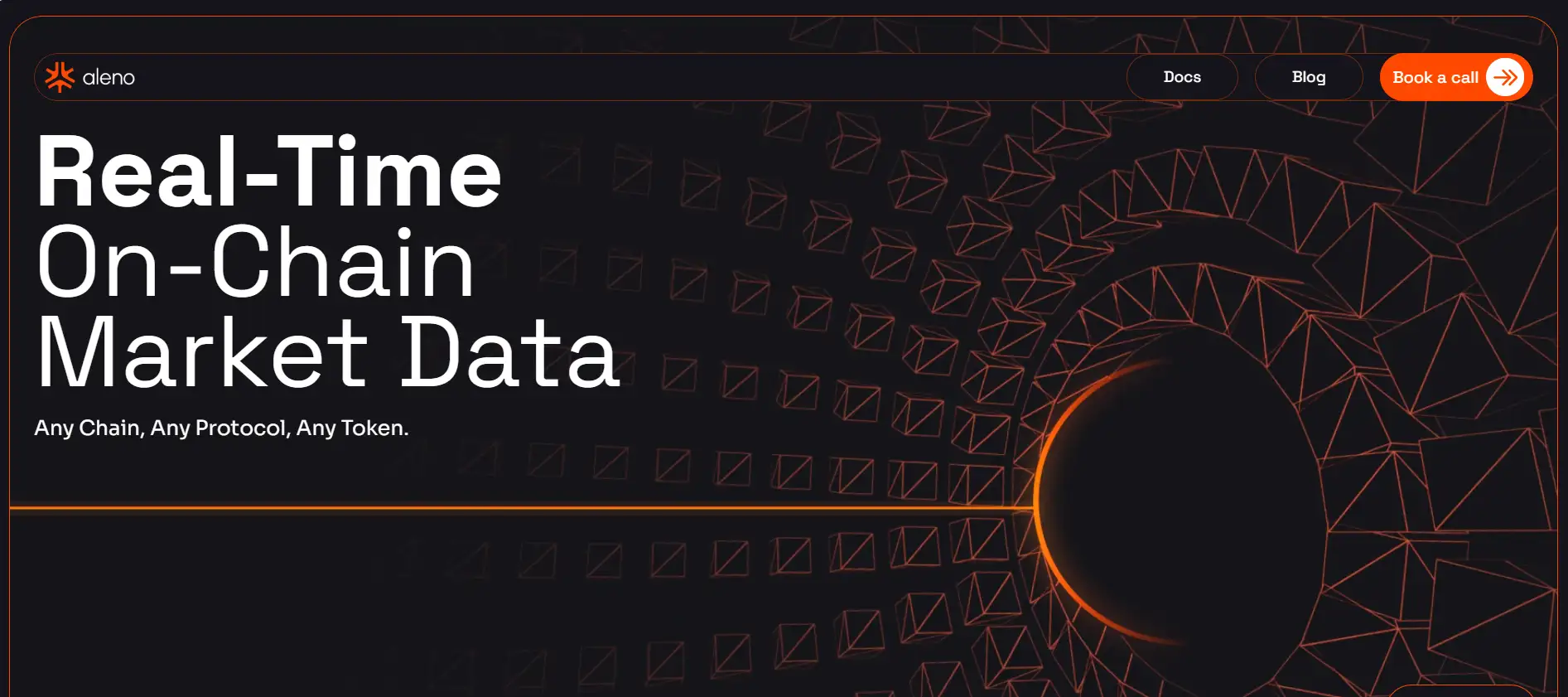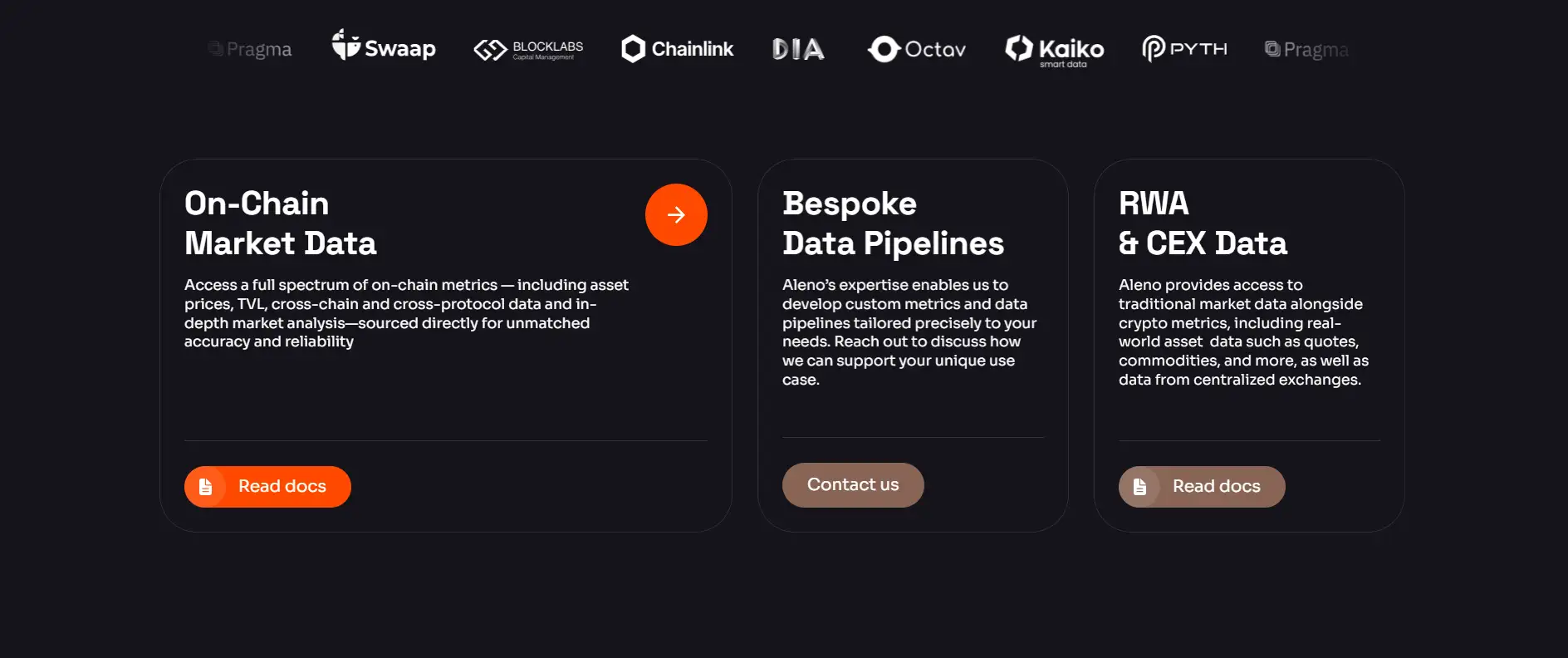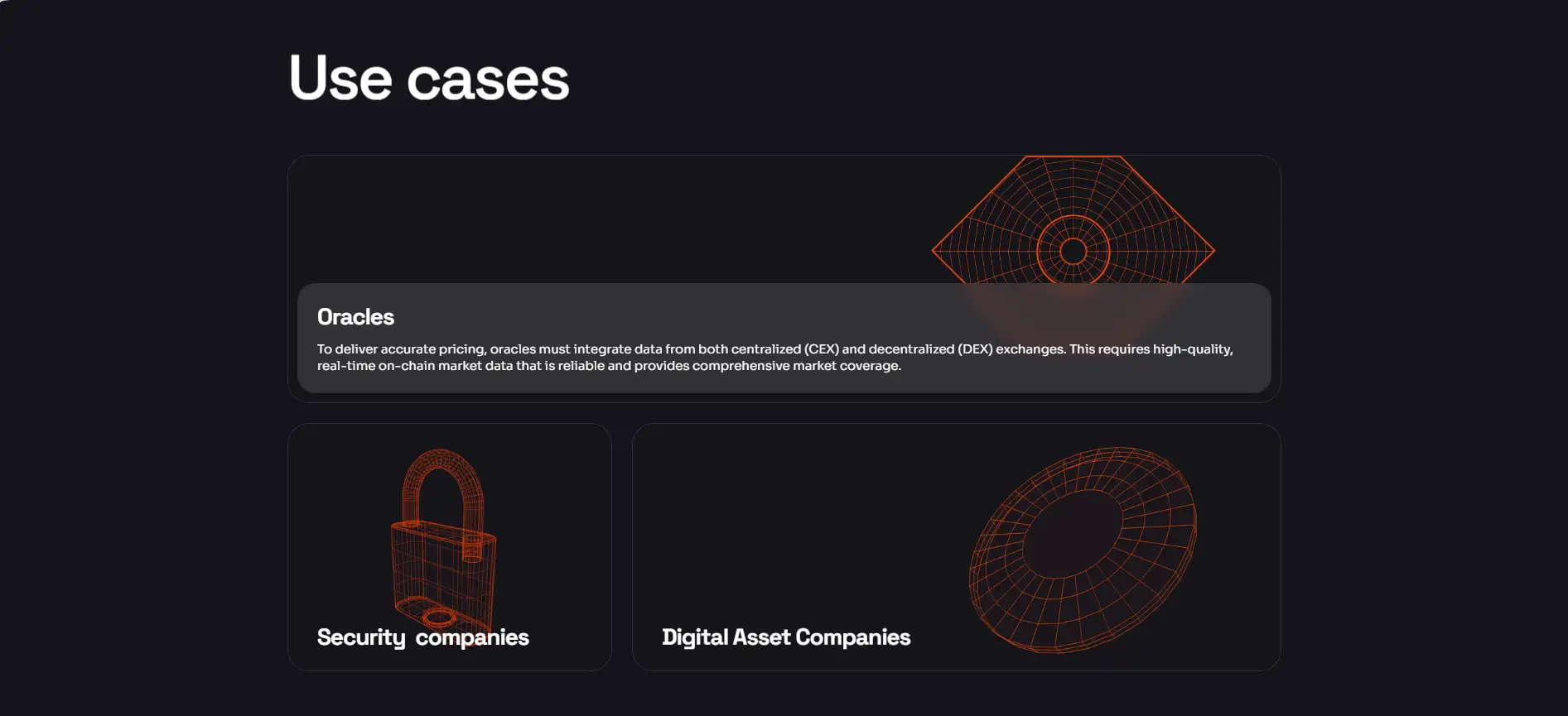About Aleno
Aleno is a high-performance on-chain market data platform that delivers real-time, cross-chain pricing and liquidity information for digital assets. Purpose-built for oracle networks, DeFi analytics, and institutional-grade infrastructure, Aleno seamlessly integrates decentralized (DEX) and centralized (CEX) exchange data to ensure accurate, transparent, and composable metrics.
Designed for developers, analysts, and enterprises, Aleno offers deep insights into token prices, liquidity, and volume across numerous chains and protocols. By normalizing data and applying a liquidity- and volume-weighted pricing methodology, Aleno provides a unified, scalable solution for any application needing high-fidelity, on-chain intelligence.
Aleno has emerged as a cornerstone infrastructure provider in the blockchain data space, with a core mission to deliver real-time, composable, and institutional-grade market data for the evolving world of Web3. The platform combines data from both DEXs and CEXs across a wide range of chains to support high-accuracy pricing and liquidity insights for decentralized finance (DeFi), oracles, dashboards, and analytics platforms.
The system is designed to aggregate prices using an innovative approach: asset prices are computed via volume- and liquidity-weighted averages derived from validated pools on DEXs and filtered order books on CEXs. Additionally, Kraken spot market rates are used to normalize quotes into consistent USD values. Supported DEX protocols include Uniswap v2/v3, SushiSwap, Curve, Balancer, Trader Joe, Solidly, and Solana-based exchanges like Orca and Raydium. Chains covered range from EVM-compatible networks like Ethereum, Arbitrum, and Polygon to non-EVM chains like Solana and Hedera.
What sets Aleno apart is its modular architecture and ability to deliver bespoke pipelines and metrics tailored to enterprise needs. Aleno has already been integrated by projects such as Chainlink, Forta, and Kaiko, offering everything from on-chain alert systems to machine learning models for hack detection. Through these partnerships and use cases, Aleno is proving indispensable in mission-critical blockchain applications.
As competition in the blockchain data and analytics sector intensifies, Aleno stands out by enabling real-time composability, unmatched cross-chain depth, and pricing methodologies that are transparent and dependable. Comparable platforms include Dune, Nansen, and Glassnode, but few offer the same level of real-time customization, broad liquidity sourcing, and seamless integration across on-chain and off-chain environments.
Aleno provides numerous benefits and features that make it a standout platform in the on-chain analytics ecosystem:
- Cross-Chain & Cross-Protocol Data: Aggregates data from both DEXs and CEXs across leading chains like Ethereum, Solana, Arbitrum, Polygon, and more.
- Real-Time Pricing Infrastructure: Access high-fidelity real-time pricing through production-ready APIs, suitable for oracles, trading dashboards, and institutional tools.
- Custom Metrics & Pipelines: Enterprises can request tailored data sets and metrics pipelines based on specific use cases or integrations.
- Liquidity & Volume-Weighted Pricing: Utilizes a dual-layer aggregation system to produce market-representative prices with normalization via Kraken’s spot data.
- Enterprise Integrations: Trusted by major data and security providers like Chainlink, Forta, and Kaiko for mission-critical services.
Aleno makes it easy to begin working with on-chain market data APIs:
- Step 1 – Visit the Website: Go to aleno.ai and explore the documentation to understand available endpoints and features.
- Step 2 – Get an API Key: Register for access and obtain an API key, which is required for all routes. Start with endpoints like /v1/assets/ticker to pull price data.
- Step 3 – Integrate Into Your Stack: Aleno’s endpoints are designed for easy integration into oracle networks, risk systems, and DeFi dashboards.
- Step 4 – Build or Request Custom Pipelines: Enterprises can reach out to the Aleno team for bespoke data pipelines tailored to any unique application.
- Step 5 – Support and Consultation: Book a call via aleno.ai to discuss integrations, performance needs, or use case-specific inquiries.
Aleno FAQ
Aleno uses a volume- and liquidity-weighted average to normalize prices across fragmented DEX liquidity pools. It begins by discovering all qualifying pools on supported chains and filtering out low-liquidity or volatile quotes. It then applies a weighting algorithm that factors in USD Total Value Locked (TVL) and 24h trading volume to derive a representative price. To ensure consistency, all quote assets are translated to USD using Kraken’s real-time exchange rates. This allows Aleno to unify fragmented liquidity into a single, reliable asset price.
Kraken plays a critical role in Aleno’s pricing engine by serving as a reference point for fiat-anchored tokens like USDC, USDT, and DAI. This reference allows Aleno to convert prices from various pool pairs into a consistent USD-denominated format. For example, if an asset is quoted in USDC across multiple DEXs, Kraken’s USDC/USD rate ensures all those prices are normalized accurately. This method safeguards against discrepancies caused by pool composition, delivering precise cross-market valuation.
Yes, Aleno can power real-time monitoring systems for exploit and anomaly detection. Through its enterprise offering, developers can create custom alerting pipelines that ingest live price data, volume shifts, and liquidity changes. This capability has already been deployed in partnerships with platforms like Forta, which uses machine learning models on Aleno’s data to detect suspicious on-chain behavior before damage escalates. It’s a powerful use case for security-driven DeFi protocols.
Aleno bridges the gap between DeFi and TradFi by aggregating both on-chain DEX data and centralized exchange (CEX) feeds. On the DeFi side, it offers pool-level insights and chain-agnostic token tracking. On the TradFi side, it integrates with legacy market feeds like commodities and fiat instruments. This dual capability enables financial firms and blockchain-native teams alike to build dashboards, trading tools, and risk engines that operate on a shared source of truth. Visit aleno.ai to explore integration options.
Aleno allows enterprises to build customized cross-chain dashboards by offering flexible APIs, composable endpoints, and custom metric pipelines. Businesses can define specific chains, token pairs, or metrics (like TVL, price impact, or arbitrage conditions) and request real-time delivery of that data via dedicated infrastructure. This tailored approach has proven useful for firms like Kaiko who rely on Aleno to supply mission-critical, analytics-grade data at scale.
You Might Also Like












